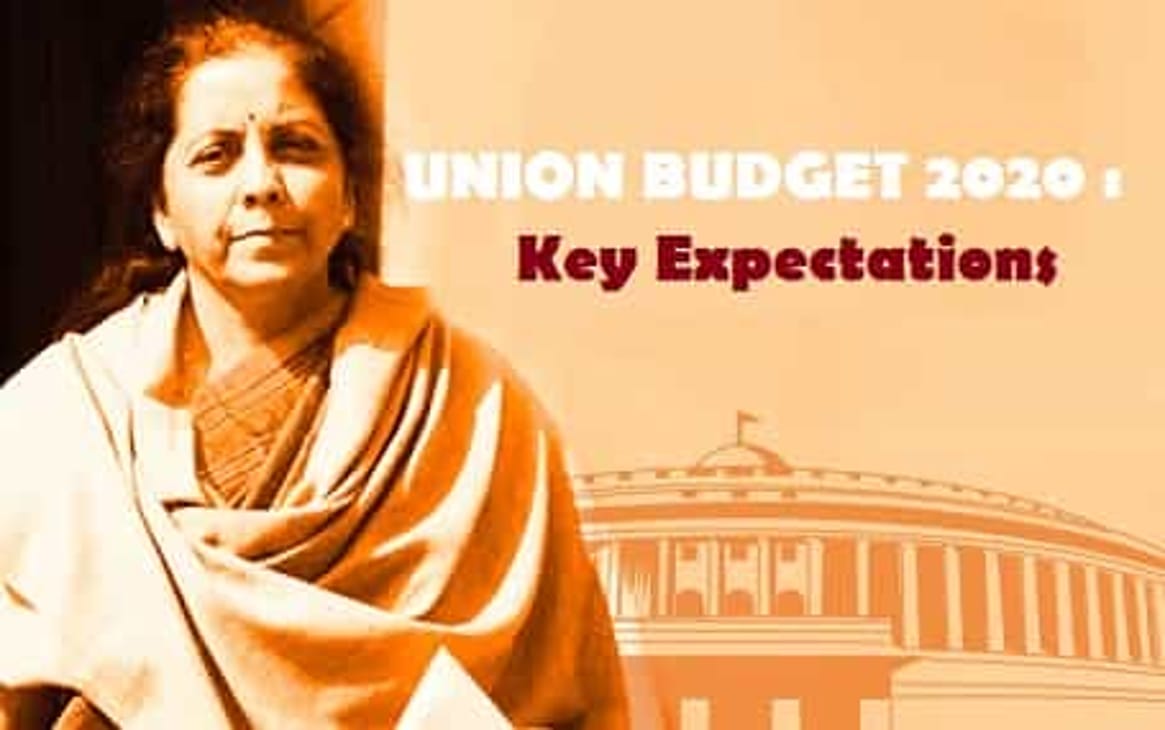Tista | Jan 23, 2020 |

Expectations from Budget 2020
• Increase in basic exemption limit : With the rise in inflation on the income which is spent out by a person, there is a need to change the exemption limit. It has been observed that the slab rates has remained unchanged since financial year 2014-15. Taking into consideration the relationship between the unchanged tax rate along with the eroding inflation, it is necessary to increase the basic exemption limit.Rather, a rebate has been provided to individuals where the total income does not exceed ₹5 lakh. However, this does not really meet the wider expectation of providing enhanced exemption to all.
When we look at the income threshold limits on which tax is levied for individuals, the last change was made in 2014 when the Modi government presented its first Union budget. Since then, there has not been any major change in these limits albeit some benefits and sops which were given in the years that followed. Thus, the increase in basic exemption limit is one of the note worthy expectation from the upcoming budget.
• Increase in deduction under section 80C : The limit of deduction under section 80C has remained unchanged since the past 5 years. Also the limit of ₹1.5 lakhs under section 80C is inclusive of amount paid on account of tuition fees, principal amount paid on account of loan for purchase of residential house property, LIC premium amount, etc., which are the basic necessities of an individual. The limit of ₹1.5 lakhs is considered as very low, taking into consideration the overall rise in the inflation rate. Alternatively, a separate section may be introduced, in order to provide deductions for certain high-value transactions.
• Increase in deductions in relation to purchase of house property : Presently, there are certain sections which provides deduction of principal as well as interest amount on purchase of house property, but the same is restricted to value of house property being not more than ₹45 lakh and loans up to ₹35 lakh. The expectation is that this is extended to all first time home buyers irrespective of the property value, which will result in a big relief for individuals contemplating to invest in their primary homes.
• Increase in deduction for tuition fees : Deductions for tuition fees are covered under section 80C. In today’s competitive world, education from a premier school has become a necessity and the deduction limit under section 80C is insufficient to cover up the yearly fees spent by the assessee. This limit is required to be increased, taking into consideration the amount spent by the assessee on tuition fees.
• Deduction on fixed deposit interest : Section 80TTA provides for deduction of interest income on savings account. Such a similar deduction should also be available to interest income on fixed deposits. With low interest rates, which does not reflect the inflationary trends, and with taxes eating into such incomes, fixed income investments do not provide any benefit to investors. Also the deduction limit of ₹10000 on interest on savings account is quite low. Hence, extending the deduction to fixed deposit interest is in the wish list of the assessees.
• Enhancement of limits for various exempt allowances : The present taxation system provides for certain exemptions that are allowed to individual tax payers but the thresholds are considered as not in line with the actual expenditure incurred. Therefore, these limits may be enhanced bearing in mind the current inflation rates. The maximum limit of various allowable deductions available for claiming tax benefit have remained constant. For example, children’s education allowance is exempt up to ₹100 per month for maximum two children has not been changed over the years, which can be enhanced to ₹500 per month per child, children’s hostel allowance limit can be enhanced from₹300 to ₹1,500 per month per child and meal vouchers from ₹50 to ₹100 per meal. Also, the limit of standard deduction may be enhanced from ₹50,000 to at least₹75,000.
• Increase in exemption limit on LTCG tax : LTCG tax was re-introduced in Union Budget 2018 making it mandatory for an investor to pay 10% LTCG tax on profit made over ₹1 lakh in a year if he/she sells listed equity shares and equity-oriented mutual funds after keeping them for one year. The expectations are the government will increase the current exemption limit from ₹1 lakh to ₹2 lakh.
• Doing away with Double Taxation on Dividend Distribution Tax : Any domestic company which is declaring/distributing dividend is required to pay DDT at the rate of 15% on the gross amount of dividend as mandated under Section 115O. Therefore the effective rate of DDT is 17.65% on the amount of dividend. Dividend Distribution Tax (Sec 115 O) is 15%.The argument extended by most of the corporate houses is that, it leads to double taxation. Dividend is nothing but distribution of profit of the companies. It is after paying income-tax on the profits earned by the companies, that the profit is distributed among shareholders. Dividend distribution tax is further levied on the profits distributed to the shareholders of a company.
The profits of a company are supposed to be the income of shareholders. This way they as part owners i.e. the shareholders have already been taxed. Dividend distribution tax thus amounts to double taxation; the fact that the companies in India are already paying high corporate tax on these profits further deteriorates the condition of the shareholders.
For Regular Professional Updates Join : https://t.me/Studycafe
Click Here to Buy CA INTER/IPCC Pendrive Classes at Discounted Rate
Tags : Budget 2020
In case of any Doubt regarding Membership you can mail us at [email protected]
Join Studycafe's WhatsApp Group or Telegram Channel for Latest Updates on Government Job, Sarkari Naukri, Private Jobs, Income Tax, GST, Companies Act, Judgements and CA, CS, ICWA, and MUCH MORE!"